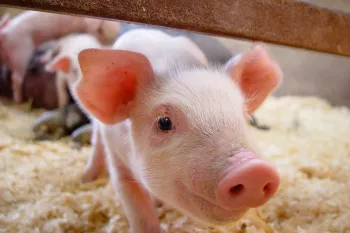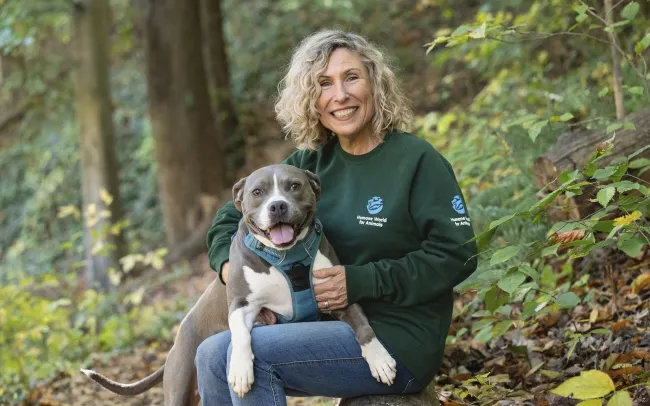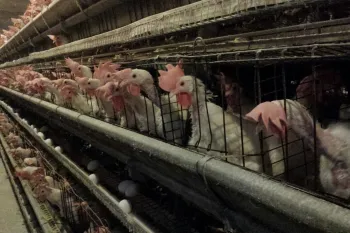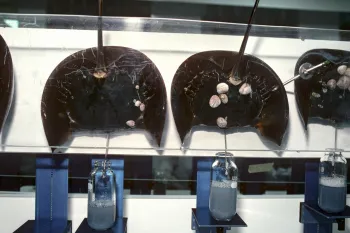The longest federal shutdown in American history has ended. The funding package that was passed by the U.S. House and Senate earlier this week has now been signed into law.
While the bill is complex, we find several promising outcomes we have been working to secure all year long in the appropriations bill for the U.S. Department of Agriculture and the Food and Drug Administration.
First, there was no language in the package to overturn California’s Proposition 12, the pioneering law for farmed animal welfare and public health that has been the target of unrelenting assaults by Big Pork and a few zealous allies in Congress. Proposition 12 and similar measures in more than a dozen other states have not only produced demonstrable animal welfare benefits; they have permanently shattered the idea that the cruelest way of raising pigs is the best way, and propelled many farmers into a more humane way of doing business, one that frees pregnant pigs from gestation crates where they can hardly move a few inches in any direction. This is the paradigmatic example of our strong defense in the face of ominous threats to landmark animal protection legislation. There’s no going back, and we will keep up the fight to ensure that overturning Proposition 12 is not included in other legislative packages.
The appropriations package maintains funding for USDA enforcement of the Animal Welfare Act (over $37 million) and the Horse Protection Act ($3.5 million). Sustaining the current funding levels is a clear win, especially in the current environment, as other programs are being slashed and any cuts here would be a setback to this critical work.
In addition, the package as approved provides crucial direction for ongoing work to advance commitments to non-animal testing methods at the FDA.
Here are some key details related to animal issues:
Animal fighting
Language encouraging the USDA to increase efforts to combat and investigate animal fighting was included in the package.
Animal testing alternatives
This year, the FDA has given significant attention to increasing reliance on non-animal methods. The final bill includes language encouraging initiatives to reduce and replace animal use, providing “cost-effective, reliable, and human-relevant advances” for safety and efficacy testing of pharmaceuticals. The bill also directs the agency to revise its regulations to make clear that animal toxicology tests are not required to support clinical testing in humans, in line with the petition we submitted to the FDA last year.
Cosmetics and sunscreen testing on animals
The package adds $2 million to aid in the implementation of the Modernization of Cosmetics Regulation Act (now funded at $9 million), to modernize federal regulatory oversight of cosmetics and personal care products and create a comprehensive and uniform national framework for regulation. When MoCRA was passed in December 2022, Congress made clear it believes that animal testing should not be used for the purpose of safety testing on cosmetic products and should be largely phased out. The package also includes language from the SAFE Sunscreen Standards Act, which modernizes the FDA’s review process for over-the-counter topical drugs such as sunscreen ingredients. Not only will this improve U.S. consumers’ access to newer, effective UV filters, but it also requires new guidance from the FDA on how non-animal methods and real-world evidence can be used to demonstrate the safety of sunscreen’s active ingredients to align with modern research practices and ethical standards.
Domestic violence survivors and their pets
Funding for domestic violence service providers, under the Protecting Animals with Shelter (PAWS) grants, was restored to $3 million, a direct result of our work to prevent cuts to this program. Since its passage in 2018, PAWS has enabled shelters in 26 states (red, blue and purple) to accommodate those escaping with their pets. The need for the grants is clear, as each year, there are many more applications than available funds.
Horse protection
The final package retained the Senate’s $3.5 million for Horse Protection Act enforcement, rejecting the House’s $1 million cut. Our requested language urging the USDA to fully enforce legal protections intended to prevent horse soring, including the training of inspectors and transparency on enforcement data, was also retained.
Horse slaughter
A longstanding annual provision we strongly support to prevent horse slaughter operations, which has blocked horse slaughter on American soil for nearly two decades, was again included in this package.
Horseshoe crabs
Language retained in the final agreement directs the FDA to publish revised draft guidance to include acceptance of non-animal versions of the protein in horseshoe crab blood typically used to test for contamination of medical products. This will help protect the nearly 1 million horseshoe crabs taken from the wild every year to be used in labs.
Humane slaughter
Both House and Senate reports support tracking and public disclosure of enforcement of the Humane Methods of Slaughter Act and enhanced training on humane handling rules for live animals as they arrive and are offloaded and handled in pens, chutes and stunning areas. The package maintains at least 148 full-time equivalent positions dedicated solely to inspections and enforcement related to this law.
Lethal control and wildlife services
The package retains terrible House report language supporting the continued use of M-44 cyanide traps—which often cause injury or death of both targeted wildlife and non-targeted wildlife and companion animals—and directs the Animal Plant and Health Inspection Service to fully incorporate their use in wildlife damage management strategies as appropriate. In better news, there was a $500,000 increase to support nonlethal wildlife management by the USDA’s Wildlife Services division.
Marine mammal protection
The package maintains Senate report language directing APHIS to prioritize the development and finalization of a humane and science-based rule to modernize regulations to protect captive marine mammals.
Pet food and pet food label regulation
The package did not include House bill language mirroring the Pet Food Uniform Regulatory Reform Act, which would set uniform standards for dog and cat pet food and pet food labels across the country and possibly prohibit states from collecting fees that support spay and neuter activities. Instead, the final bill language simply asks the FDA to assess the costs and implications of a rule to meet the same end via modernization of the regulatory framework governing pet food production.
Veterinary loan repayment
There is a critical shortage of veterinarians throughout the country, which is particularly problematic in rural areas and in the farmed animal sector. The package maintains important funding at $10 million for the Veterinary Medicine Loan Repayment Program, which supports graduating veterinarians who locate their practices in underserved areas.
—
During the shutdown, we actively communicated with key congressional offices, stayed in touch with government and industry partners, built support for these measures and did everything possible to keep animal protection issues in focus. We’re glad to be able to report that, thanks to your unwavering support, we achieved these successes for animals and the people who care about them.
Kitty Block is president and CEO of Humane World for Animals. Follow Kitty Block on X. Sara Amundson is president of Humane World Action Fund.




